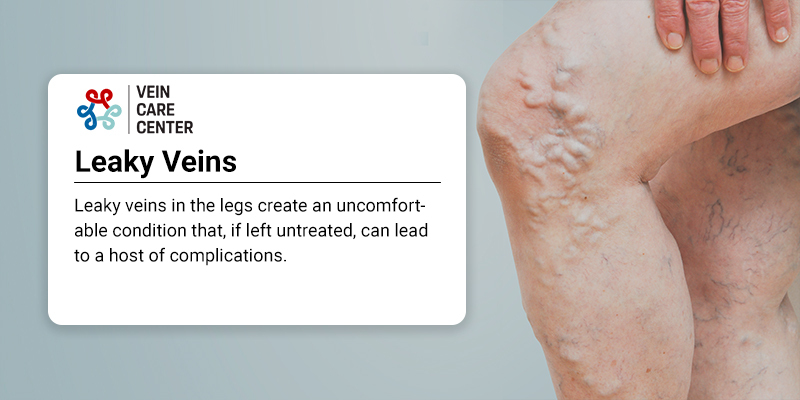

Leaky veins in the legs create an uncomfortable condition that, if left untreated, can lead to a host of complications. The condition is caused by damage to the valves in the veins that control the flow of blood to the heart. The result is a loss of blood, visible veins showing through your skin or even skin ulcers. Learn how to treat leaky veins through a comprehensive treatment at the Vein Care Center. With offices in Midtown Manhattan, Upper East Side, the Financial District and Greenwich Village in New York City, there is an office near you. In New Jersey, call on the vein experts in Paramus, East Brunswick, Riverdale, Englewood Cliffs and Cranford.
Veins are part of your circulatory system. They transport blood back to the heart and lungs for oxygenation. Veins have one-way valves to prevent blood backflow, but with valve damage, blood leaks back, hence the term leaky veins.
This is most often a vein problem that affects your deep or superficial leg veins. The blood flows backward, a condition called reflux, where it causes pain, swelling and other symptoms that affect your quality of life. If the blood doesn’t flow back to the heart for oxygenation, you’ll experience physical challenges and other health complications, as well.
Doctors often use other terms for leaky veins, including venous reflux disease, chronic venous insufficiency or vein disease. At the Vein Care Center in New York City and New Jersey, the expert doctors, led by Dr. Jonathan Arad, use individualized approaches for the effective treatment of leaky veins and other vein conditions. They rely on an interventional approach and advanced vein treatments to achieve the best outcomes for you.

Like most vein conditions, the symptoms of leaky veins in the legs aren’t severe, which may cause you to ignore them. But delayed treatment can lead to further complications that require more extensive treatments. If the symptoms of this venous condition are bad enough, call for an immediate vein consultation so you can get quick, effective treatment.
Signs that you may have leaky veins include:
If you observe any of these symptoms, Dr. Arad and the team at the Vein Care Center locations can help. The board-certified surgeon specializes in the diagnosis and treatment of leg pain, cramps, restless legs, varicose veins and spider veins. You can schedule an appointment at any of these locations – the Financial District, Greenwich Village and Midtown Manhattan, and Upper East Side, as well as throughout Bergen County, Morris County and Union County, New Jersey.
The problem with valves in your leg veins develops over time. Damage to the valves — or any problem causing malfunction of the valves — hinders the smooth flow of blood back to the heart, leading to leaky veins. Valve malfunction in the veins can affect anyone but some factors or conditions can make you more vulnerable.
Common risk factors that make you prone to this vein condition include:
Through careful examination of your medical history, a physical examination and diagnostic tests, Dr. Arad can identify the cause of your vein condition. Then he discusses with you the factors that make you vulnerable to leaky veins so you can prevent them in the future.
"They delivered what they promised, a wonderful experience. The minute you get in you get a pleasant vibe. I would definitely recommend this place.
Sharon R.With a correct diagnosis, treatment for leaky veins is much more successful. Your doctor chooses a treatment plan based on the diagnosis report, your age, the severity of your condition, complications that may have resulted and your overall health.
Treatment for leaky veins always begins with the least invasive procedure and may include:
If you’ve noticed symptoms of leaky veins, contact a vein specialists at Vein Care Center for an accurate diagnosis and treatment. The doctors utilize the latest medical technology and know how to treat leaky veins and many other vein conditions.